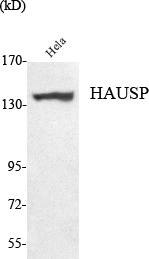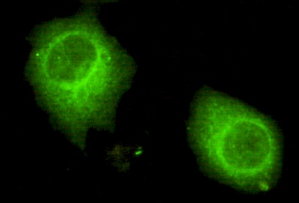HAUSP Monoclonal Antibody
- Catalog No.:YM1039
- Applications:WB;IF
- Reactivity:Human;Mouse;Rat;Dog;Pig
- Target:
- HAUSP
- Fields:
- >>FoxO signaling pathway;>>Epstein-Barr virus infection;>>Viral carcinogenesis
- Gene Name:
- USP7
- Protein Name:
- Ubiquitin carboxyl-terminal hydrolase 7
- Human Gene Id:
- 7874
- Human Swiss Prot No:
- Q93009
- Mouse Gene Id:
- 252870
- Mouse Swiss Prot No:
- Q6A4J8
- Rat Gene Id:
- 360471
- Rat Swiss Prot No:
- Q4VSI4
- Immunogen:
- Purified recombinant human HAUSP (C-terminus) protein fragments expressed in E.coli.
- Specificity:
- HAUSP Monoclonal Antibody detects endogenous levels of HAUSP protein.
- Formulation:
- Liquid in PBS containing 50% glycerol, 0.5% BSA and 0.02% sodium azide.
- Source:
- Monoclonal, Mouse
- Dilution:
- WB 1:1000 - 1:2000. IF 1:100 - 1:500. Not yet tested in other applications.
- Purification:
- Affinity purification
- Concentration:
- 1 mg/ml
- Storage Stability:
- -15°C to -25°C/1 year(Do not lower than -25°C)
- Other Name:
- USP7;HAUSP;Ubiquitin carboxyl-terminal hydrolase 7;Deubiquitinating enzyme 7;Herpesvirus-associated ubiquitin-specific protease;Ubiquitin thioesterase 7;Ubiquitin-specific-processing protease 7
- Molecular Weight(Da):
- 128kD
- Background:
- The protein encoded by this gene belongs to the peptidase C19 family, which includes ubiquitinyl hydrolases. This protein deubiquitinates target proteins such as p53 (a tumor suppressor protein) and WASH (essential for endosomal protein recycling), and regulates their activities by counteracting the opposing ubiquitin ligase activity of proteins such as HDM2 and TRIM27, involved in the respective process. Mutations in this gene have been implicated in a neurodevelopmental disorder. [provided by RefSeq, Mar 2016],
- Function:
- catalytic activity:Ubiquitin C-terminal thioester + H(2)O = ubiquitin + a thiol.,enzyme regulation:Inhibited by N-ethyl-maleimide (NEM) and divalent cations. Tolerates high concentrations of NaCl but is inhibited at concentrations of 195 mM and higher.,function:Cleaves ubiquitin fusion protein substrates. Deubiquitinates TP53/p53 and MDM2 and strongly stabilizes TP53 even in the presence of excess MDM2, and also induces TP53-dependent cell growth repression and apoptosis.,PTM:Polyneddylated.,PTM:Polyubiquitinated.,similarity:Belongs to the peptidase C19 family.,similarity:Contains 1 MATH domain.,subcellular location:Present in a minority of ND10 nuclear bodies. Association with VMW110 at early times of infection leads to an increased proportion of USP7-containing ND10. Colocalizes with ATXN1 in the nucleus.,subunit:Monomer. Interacts with TP53, MDM2 and UBXN6. Interacts with herpesvirus
- Subcellular Location:
- Nucleus . Cytoplasm . Nucleus, PML body . Chromosome . Present in a minority of ND10 nuclear bodies. Association with ICP0/VMW110 at early times of infection leads to an increased proportion of USP7-containing ND10. Colocalizes with ATXN1 in the nucleus. Colocalized with DAXX in speckled structures. Colocalized with PML and PTEN in promyelocytic leukemia protein (PML) nuclear bodies.
- Expression:
- Expressed in neural progenitor cells (at protein level) (PubMed:21258371). Widely expressed. Overexpressed in prostate cancer.
- June 19-2018
- WESTERN IMMUNOBLOTTING PROTOCOL
- June 19-2018
- IMMUNOHISTOCHEMISTRY-PARAFFIN PROTOCOL
- June 19-2018
- IMMUNOFLUORESCENCE PROTOCOL
- September 08-2020
- FLOW-CYTOMEYRT-PROTOCOL
- May 20-2022
- Cell-Based ELISA│解您多样本WB检测之困扰
- July 13-2018
- CELL-BASED-ELISA-PROTOCOL-FOR-ACETYL-PROTEIN
- July 13-2018
- CELL-BASED-ELISA-PROTOCOL-FOR-PHOSPHO-PROTEIN
- July 13-2018
- Antibody-FAQs
- Products Images

- Western Blot analysis using HAUSP Monoclonal Antibody against HeLa cell lysate.

- Immunofluorescence analysis of HeLa cells using HAUSP Monoclonal Antibody.



